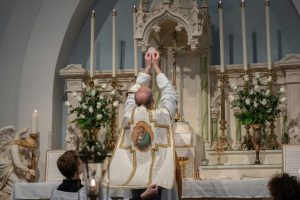Parishes and dioceses often miss the mark when it comes to multiculturalism, argues Carmen Aguinaco.
"We don't have anything in Spanish or geared to the Hispanic community here. We simply don't have any Hispanics," my pastor told me. "Are the Rodriguezes, the Lopezes, and the Garcias that I know in this neighborhood Polish?" I asked.
"No; but they have been here for so long, they'd rather attend the regular Mass."
Regular? And what, exactly, is regular within the Body of Christ, I wonder? Like Saint Paul once said: Is the foot better than the hand? Who has decided what must be the norm in worship and expression of faith?
For all its expressed commitment to the ideals of reflecting multiculturalism, instances like this show just how far the Catholic Church still needs to grow.
Another example: A parish council composed of people of different nationalities meets. A member of one of these ethnic groups comments: "We came here and adapted to the culture here. We accept the fact that Hispanics need their things in Spanish for a time; but of course, we expect them to learn English and do things like the rest of us." In other words, Spanish was something to be tolerated for the time being– not something that would be acceptable in the end.
Never mind that most Hispanics either do know English or are more than willing to learn it. But the fact remains: culture is much more than language, and gospel values have an altogether different language.
There was a time in this country when minority groups were not allowed to speak their own language in worship. Or, at the most, they would be given the opportunity to worship in the church basement. There was a time when immigrant groups set up their own national parishes and tried to show-through their establishments, churches, and schools-that they were civilized, peace-loving people, worthy of taking a place in American society.
Looking back, they might have been trying to earn some tolerance. And it would seem that in a society where waves of immigrants in the past were forced to integrate into the dominant culture, tolerance of minorities should be quite a step forward.
And perhaps it is.
But I–and a number of people I have been talking to recently–don't want to merely tolerate, and we are not asking for tolerance in return. We don't like the word or the concept. Touting tolerance as a triumph for church or culture places one group of dominant people in a good light, encourages complacency, and doesn't really acknowledge the true value of the "other." Tolerance places the tolerant, "normative" person or group in a position of superiority.
Tolerance is almost like saying: "You are inferior; you bother me. I don't understand your values or your culture. I don't like you, but, because I am a big person–or group–I, or we, will tolerate you." It is condescending and annoying to people on the receiving end. And by encouraging complacency–tolerance calls for merely cosmetic and painless changes, after all–it breeds indifference. It leaves the dominant culture as dominant and only grudgingly makes room for the different.
A tolerant parish, for instance, will finally–often after there has been a public outcry for a number of years–acknowledge the presence of a minority group in its boundaries and schedule a Mass in Spanish (or any language other than English, for that matter). But it will be at a time when it least inconveniences the Anglo congregation. The message here is loud and clear: The "white" church is the real one, the important one, but we will do a good thing by tolerating; we will show some charity to those who are darker, or speak a different language, until they learn English and our ways, becoming like us.
A tolerant parish will occasionally hold a celebration including the foods of other countries, a touch of their color, and perhaps even some distinctive music. Staying at the level of folklore is, of course, quite safe. A tolerant diocese will set up an Office of Ethnic Ministries, throwing all colors in it as if the dominant culture did not belong to any ethnic group and were colorless. (Naturally, it does not need special attention, because it has all the attention in the world.)
Tolerance is not limited to Anglo congregations. A tolerant Hispanic community will look condescendingly on the other communities who "don't understand anything about community or fiesta." Members of a tolerant Hispanic community will not think twice about translating the offensive message on a T-shirt: "Family: you wouldn't understand. It's a Hispanic thing."
Tolerance might be a good thing to strive for in society, but it is not good enough for the Body of Christ. Come to think of it, as applied to the church, the concept is preposterous, even schizophrenic. Could a heart ever "tolerate" a leg? Or a finger tolerate a liver? In medical terms we hear the word referring to transplanted organs: liver tolerance, heart tolerance. Here, the organ is an alien, a guest in the original body.
But there are no aliens or guests in the Body of Christ. The Body of Christ was not originally Anglo–with Italians, Hispanics, Asians, or African Americans later transplanted to be rejected or accepted by the host organism. They belong there. Likewise, minority groups do not constitute the Body of Christ on their own. They have no right to tolerate–or to reject–Anglos.
While it is true that most businesses are moved by financial rather than spiritual interests, many have done better than some churches in demonstrating that we can do more than tolerate. There is an ad for Continental Airlines, for instance, that claims: "We don't translate; we think in Spanish." Translation is the language of tolerance. But the church should have a language of its own, beyond translation, and therefore beyond tolerance.
Those of us who speak more than one language know very well that translations are often treacherous. Syntax, word order, rhythms, or lack of understanding creep into a translation and change at the very least the flavor, at worst the whole meaning of a text. In order to really know the language, one must think in that language, not merely translate. Tolerance is translation, and a poor translation at that. Being the Body of Christ means thinking in the language of the other.
What would a church that does not tolerate, does not merely translate, look like? In liturgical terms it would be a church where worship would enjoy all the solemnity and the reverence of the Anglo ritual together with the warmth, color, and sense of celebration and implication of the body of the Hispanic one.
It would be a church where a powerful spirit of community wouldn't overwhelm the sense of individuality and a personal relationship with God.
It would be a church where the spirit of sacrifice for others often overcomes the sense of personal convenience, but also where the pain of death always looks in hope to the Resurrection.
It would be a church where Hispanics would learn to think in the language of efficiency and affirmation of their own individuality, while Anglos would learn to give more prominence to the language of community and family as a much larger reality than pure blood lines.
It would be a church where an Anglo culture that has been hard at work trying to deny pain and difficulty, and even death, would learn to face it calmly and in hope. Where a Hispanic culture that has been oppressed for ages would shake off, to a certain extent, its sense of fatalism and resignation to sorrow–engaging as well in the affirmation of rights and the change of "what has always been" because "asi es la vida."
It would be a church where the deep meaning of popular religiosity is discovered and appreciated by all the groups while there is a discernment and openness to shed fanatical belief in the magical or superstitious.
It would be a church where the search for a culturally welcoming church community does not become "parish hopping" and where Hispanics learn a sense of responsible stewardship.
Tolerance would be unheard of in such a community. The concept itself would not be understood. After all, we don't need to tolerate ourselves.
This article appeared in the July 2000 issue of U.S. Catholic (Vol. 65, No. 7, pages 22-26).













Add comment